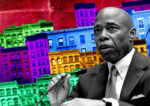“If it bleeds, it leads,” is a guiding principle in the tabloid business, but the perceptive rise of crime in New York City has leapt off front pages to residential brokers’ business.
A bruising election cycle and relentless media coverage has made crime a top concern among New York City residents and observers. The reality is more complicated than sound bites portray: overall crime rates are down from recent decades, and while murders and shootings are still up from prepandemic levels, anxiety has far outpaced the gains in certain types of crime.
Brokers say the perception of danger as a growing part of life in New York City has left clients nervous.
“There’s a lot of contradictory information but it certainly affects every aspect of life in Manhattan, including real estate,” said Compass broker Pamela D’Arc.
Added scrutiny from public officials and media attention add an extra wrinkle for brokers already contending with a slowing market. Conversations are difficult with both out-of-town buyers and clients looking to move boroughs.
“It’s something that’s come up a lot more than in the past when I’m working with buyers,” Robinson said. “Especially buyers purchasing homes for their children.”
Brokers find themselves confronted by uncomfortable questions from buyers, who suddenly have another reason not to pull the trigger on a sale. Navigating conversations about local crime, safety and homeless populations is tricky, because brokers can’t steer buyers to certain neighborhoods or discuss neighborhood demographics for concern of violating fair housing laws.
Read more



For brokers who are also New Yorkers, crime isn’t an abstract issue. Robinson said she relates to clients’ concerns, built on fear over reported incidents like a man following her onto a subway car earlier this year.
“Something needs to change,” Robinson said. “I’ve been nervous to walk the dogs before the sun comes up or after it goes down.”
Robinson said many of her buyers are moving closer to where they work or send their children to school to avoid the subway.
Mayor Eric Adams, a former police captain who made crime a key point of his campaign, recently unveiled a plan to involuntarily hospitalize homeless New Yorkers deemed mentally ill. The initiative was Adams putting his policy action where his claims are, but critics have questioned its enforcement and potential consequences.
“It’s hard to react the same way as a person and as an agent,” Coldwell Banker Warburg president Frederick Warburg Peters said on the policy as the latest balancing challenge for brokers juggling the city’s reality with its perception.
“As a person, one desperately wants better services for the mentally ill and I’m pretty unconvinced that what Adams is proposing is much more than a band-aid,” said. “Speaking as a broker, obviously anything which gives the greater appearance of safety to the city is good for us.”
When questions about crime and safety arise, Peters recommends brokers steer clear of advising clients on quality of life issues.
“I will sometimes make economic arguments to people but about a quality of life issue, really they’ve got to be the ones to decide,” he said. “In that situation I would undoubtedly say I’ve lived in the city my whole life, I’ve seen crime ebb and flow but this is your decision and it’s a big financial decision and you’ve got to feel comfortable about it.”
